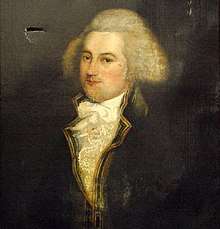William Houstoun (lawyer)
William Houstoun, also spelled Houston, (/ˈhaʊstən/ HOW-stən) (c. 1755 – March 17, 1813) was an American planter, lawyer and statesman. He served the Province of Georgia as a delegate to the Continental Congress and later the State of Georgia to the United States Constitutional Convention in 1787.[1]
William Houstoun | |
|---|---|
 Painting of Houstoun by Archibald Robertson, 1791 | |
| Born | c. 1755 |
| Died | March 17, 1813 Savannah, Georgia, United States |
| Resting place | St. Paul's Chapel, New York City |
| Citizenship | Kingdom of Great Britain (1755-1776) American (1776-1813) |
| Education | Inner Temple, London, Kingdom of Great Britain |
| Occupation | Lawyer, planter, statesman Delegate from the Province of Georgia to the Congress of the Confederation Delegate from the State of Georgia to the Constitutional Convention (United States) |
| Spouse(s) | Mary Bayard (married 1788) |
| Parent(s) | Sir Patrick Houstoun, father |
Early life
William Houstoun was the son of Sir Patrick Houstoun, a member of the council under the royal government of Georgia. He was born in 1755 in Savannah, Georgia. Houstoun received a liberal education, which included legal training at Inner Temple in London.
Role in the Continental Congress
The American Revolution cut short his training, and Houstoun returned home to Georgia. For many years members of Houstoun's family had been high officials in the colony. With the onset of war, many remained loyal to the crown, but William, a zealous advocate of colonists' rights, was among the first to counsel resistance to British aggression.
Houstoun represented Georgia in the Continental Congress from 1783 through 1786. He was chosen as one of Georgia's agents to settle a boundary dispute with South Carolina in 1785 and was one of the original trustees of the University of Georgia at Athens.[1]
Delegate to the Georgia Convention
When the Constitutional Convention convened in 1787, Houstoun presented his credentials as one of Georgia's delegates. He stayed for only a short time, from June 1 until about July 23, but he was present during the debate on the representation question. Houstoun split Georgia's vote on equal representation in the Senate, voting "nay" against Abraham Baldwin's "aye." His fellow Georgia delegate William Pierce wrote of him: "As to his legal or political knowledge, he has very little to boast of. Nature seems to have done more for his corporeal than mental powers. His Person is striking, but his mind very little improved with useful or elegant knowledge."[2]
Later life
Houstoun married Mary Bayard, the daughter of Nicholas Bayard (baptized 1736[3]), a member of the Bayard family, prominent in New York City, from which Bayard Street takes its name. Houston Street, originally part of his father-in-law's estate in the New York City Borough of Manhattan was named for Houstoun,[4] using an alternate spelling.
Houstoun died in Savannah on March 17, 1813, and was interred in St. Paul's Chapel in New York City.[1]
References
- United States Congress. "William Houstoun (id: H000832)". Biographical Directory of the United States Congress.
- Pierce, William (1911). "CXIX. William Pierce: Character Sketches of Delegates to the Federal Convention.". In Farrand, Max (ed.). The Records of the Federal Convention of 1787. Vol. 3. New Haven, Conn.: Yale University Press. p. 97. LCCN 11005506. OCLC 349356. Retrieved November 24, 2011.
- Bulloch, Joseph Gaston Baillie (1919). A History and Genealogy of the Families of Bayard, Houstoun of Georgia, and the Descent of the Bolton Family from Assheton, Byron and Hulton of Hulton Park. J. H. Dony.
- Cohen, Marjorie. "The meaning behind the city's best-known streets". 2 February 2012. AM New York. Retrieved 12 October 2012.